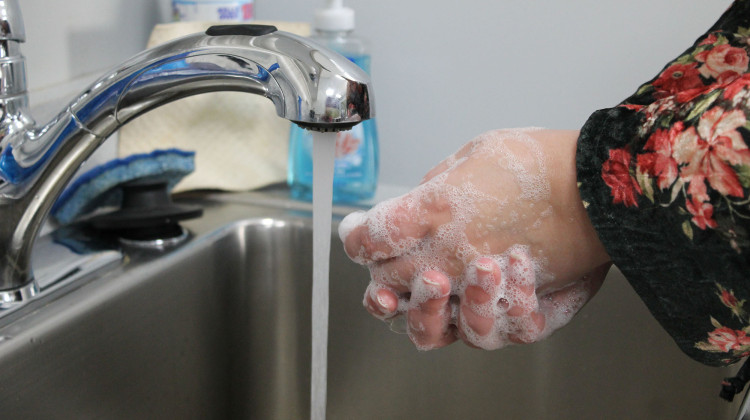
One expert said people can try to avoid getting sick by practicing food safety, cleaning surfaces with effective disinfectants like bleach, and properly washing their hands.
Abigail Ruhman / IPB NewsThe Centers for Disease Control and Prevention released data that shows a recent spike in outbreaks of norovirus — a highly contagious virus that causes vomiting and diarrhea. One expert said that spike is pretty typical for this time of year, but people can still take precautions to avoid getting sick.
Norovirus is sometimes known as the “stomach bug” or the “stomach flu,” but is not related to the flu virus.
Signs and symptoms can include diarrhea, vomiting, nausea, stomach pain, fever, headaches or body aches. Those will typically appear about 12 to 48 hours after exposure. Symptoms will usually last between one to three days.
Kristen Kelley, IU Health executive director of quality and safety, said people can try to avoid getting sick by practicing food safety, cleaning surfaces with effective disinfectants like bleach, and properly washing their hands.
“It's always probably best to wash your hands,” Kelley said. “The physical process of scrubbing under water removes, you know, gross soiling and also can remove the viruses.”
The norovirus pathogen is resilient, especially in comparison to other viruses like the flu and COVID-19. It can also live for much longer on surfaces. Kelley said this is why hand sanitizer or weaker disinfectants may not be as effective on this particular virus.
She said it is more easily spread in places where people gather frequently, like classrooms.
READ MORE: COVID-19 tests, variants and updated vaccines: Here’s what you need to know
Join the conversation and sign up for the Indiana Two-Way. Text "Indiana" to 765-275-1120. Your comments and questions in response to our weekly text help us find the answers you need on statewide issues.
If someone is exposed to norovirus and begins experiencing symptoms, Kelley said it’s something that should be manageable at home.
“If you have questions, just call your doctor,” Kelley said. “It really should not require an emergency visit.”
Kelley also said an increase in cases is normal for this time of year, and the data from the CDC is likely lower than reality due to under-reporting.
“We know that usually when you're sick, you don't always go to the doctor to diagnose the stomach bug,” Kelley said. “You ride it out, so more often it's probably under-reporting.”
If someone is sick, Kelley said they should focus on remaining hydrated.
“There is no specific medicine to treat it,” Kelley said. “Antibiotic drugs won't treat the norovirus, so it can be scary when fluids are coming out of both ends at times. The big thing is really watching for signs of dehydration, drinking plenty of fluids.”
Kelley recommends drinking fluids that contain electrolytes, such as an electrolyte solution or sports drinks. She said people who are sick should try to limit exposing other people as much as possible.
Abigail is our health reporter. Contact them at aruhman@wboi.org.
 DONATE
DONATE






 Support WFYI. We can't do it without you.
Support WFYI. We can't do it without you.